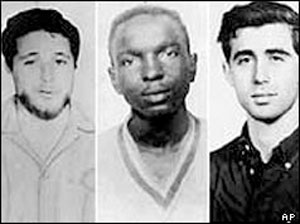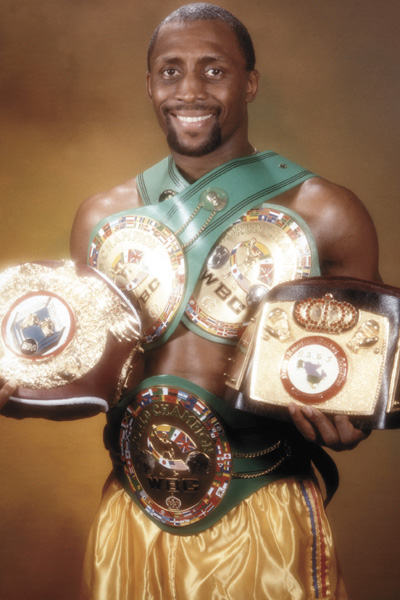1924—A man who would grow up to become one of the most prolific and complex Black writers of the 20th Century is born on this day in New York City. James A. Baldwin was a novelist, short story writer and poet. His works frequently had racial and sexual themes. In addition, he penned powerful essays on the Civil Rights Movement. Baldwin’s homosexuality is believed by many to have been a result of being raised by a “hard and often brutal father” and a submissive mother. Among his best known works are “Go Tell It on the Mountain,” “Giovanni’s Room,” and “The Fire Next Time.” In that last book, he predicted major upheavals in America if profound efforts were not taken to resolve the nation’s racial problems. He wrote, “If we do not now dare everything, the fulfillment of that prophecy, recreated from the Bible in song by a slave, is upon us. God gave Noah the Rainbow sign, no more water, the fire next time.” Baldwin died in France on Nov. 30, 1987.
1966—The Charles R. Drew Post Graduate Medical School (now Charles R. Drew University of Medicine and Science) is chartered in Los Angeles, Calif. The school was named in honor of the foremost Black doctor and research scientist of the first half of the 20th Century. Drew did pioneering work in blood transfusions and in the development of blood plasma. Drew’s life was cut short on April 1, 1950 as a result of an automobile accident in North Carolina.
1980—Thomas “Hit Man” Hearns wins the WBA welterweight title. It was one of the titles he won in five different weight classes. Hearns was the first Black boxer to achieve that feat.
1928—The Atlanta Daily World begins publication as the first Black daily newspaper in modern times. It was founded by William A. Scott III. Amazingly, the first Black daily newspaper in history—the New Orleans Tribune—was founded one year before the end of slavery in 1864.

1901—Legendary Jazz trumpeter Louis “Satchmo” Armstrong is born in New Orleans, La. Abandoned by his desperately poor parents, he was for a while a ward of the state. But by 1922, he followed the migration of Blacks to the North and ended up in Chicago where his Jazz skills really began to develop. Armstrong was frequently criticized for trying too hard to please his White audiences. Song stylist Billie Holliday once said of him, “Sure Satchmo toms but he toms from the heart.” Nevertheless, he would later become a major financial backer of Dr. Martin Luther King and the Civil Rights Movement. In addition in 1957, he backed out of a State Department sponsored tour of the then Soviet Union declaring, “The way they are treating my people in the South, the government can go to hell!” Armstrong would die on July 6, 1971.
1931—Pioneering physician Dr. Daniel Hale Williams dies. The Pennsylvania born Williams was a principle founder of Chicago’s Provident Hospital and helped train many of the nation’s early Black doctors and nurses. But he is probably best known for performing America’s first successful open heart surgery. His patient—a young Black man named James Cornish—would live for another 20 years after the surgery.

MICHAEL SCHWERNER, JAMES CHANEY and ANDREW GOODMAN
1964—The bodies of three civil rights workers are found on a farm near Philadelphia, Miss. The three (one Black and two Whites) were participating in “Freedom Summer”—when thousands of people journeyed south to participate in the Civil Rights Movement and help Blacks register to vote. James Chaney, Andrew Goodman and Michael Schwerner were kidnapped on June 21 and killed the same night. Eighteen White men, including several law enforcement officers were indicted for the killings but only seven were convicted. One of the ringleaders, a local minister named Edgar Allen Killen, would not be found guilty until June 21, 2005 after the case had been re-opened. Ironically, Killen was found guilty of manslaughter 41 years to the day that the three civil rights workers were killed. The murders of Chaney, Goodman and Schwerner helped galvanize support for the Civil Rights Movement by turning much of the nation against the terrorist-type tactics being employed by those opposed to it. Ironically, Philadelphia, Miss., elected its first Black mayor in May 2009.
1865—President Andrew Johnson reverses an order giving land abandoned or confiscated from slave-owning Whites to former Black slaves. The order—Special Field Order #15—had been issued in January by conquering Union Major General William T. Sherman as he and his troops marched through the South. Over 40,000 ex-slaves had received over 400,000 acres of land in South Carolina, Georgia and Florida. But after Lincoln was assassinated, Johnson reversed the order and returned the land to the Whites. Johnson, a Southerner, did much to reverse the policies of Lincoln and stifle progress for Blacks. Indeed, an argument can be made that President Johnson had a more negative post-Civil War impact on Black progress than any president in American history.
1870—In one of the most brazenly racist incidents of the post-Civil War period, White conservatives and racists employ assassinations and widespread violence to suppress the Black vote and take control of the Tennessee legislative from a coalition of Blacks and progressive Whites. The violence and the election effectively ended Reconstruction in the state.
1941—Blacks started being inducted into the U.S. military around April of 1941 and one result was a series of violent incidents between Black soldiers and White soldiers and between Black soldiers and White civilians. The first major incident takes place on this day in August of 1941. A group of Black soldiers board a bus in Fayetteville, N.C., headed to Ft. Bragg. The White driver complains they are being “rowdy” and asks for help from Military Police (MPs). The MPs arrive and began hitting the Blacks with nightsticks. One of the Blacks grabs an MP’s gun and begins shooting. Additional fighting and shooting break out. When the dust settled, one Black private and one White MP were dead and two Whites and three Blacks had been wounded.
1965—President Lyndon Johnson signs the Voting Rights Act which was designed to guarantee the right of African-Americans to vote. The Act ended a wide range of discriminatory voting practices in the South including literacy tests. The Act was probably the most significant piece of civil rights legislation ever passed. It was renewed for another 25 years in July of 2006. It was weakened a bit by a 2009 U.S. Supreme Court decision but remains in effect.
1970—Four people, including the presiding judge, are killed during a courthouse shootout in Marin County, Calif. A group of Blacks led by 17-year-old Jonathan Jackson stage an assault on the courthouse in a bid to free Jackson’s brother—famed Soledad Brother and militant activist George Jackson. Jonathan was among those who died. Professor and communist Angela Davis was charged with providing the guns for the bloody escape attempt but she would later be found not guilty.
1865—Explorer Matthew Henson is born in Baltimore, Md. Henson would become the first person to reach the North Pole on April 6, 1909. However, it was his boss Robert E. Perry who would receive widespread public recognition and a presidential citation for the honor. But in later years, records would show that Henson actually beat Perry to the top of the world. Henson would comment that when Perry discovered that he had beat him to the North Pole, he became “hopping mad.” Years would pass before Henson would gain some recognition for his accomplishment. Nevertheless, to this day, most history books still continue to give the honor to Perry.








